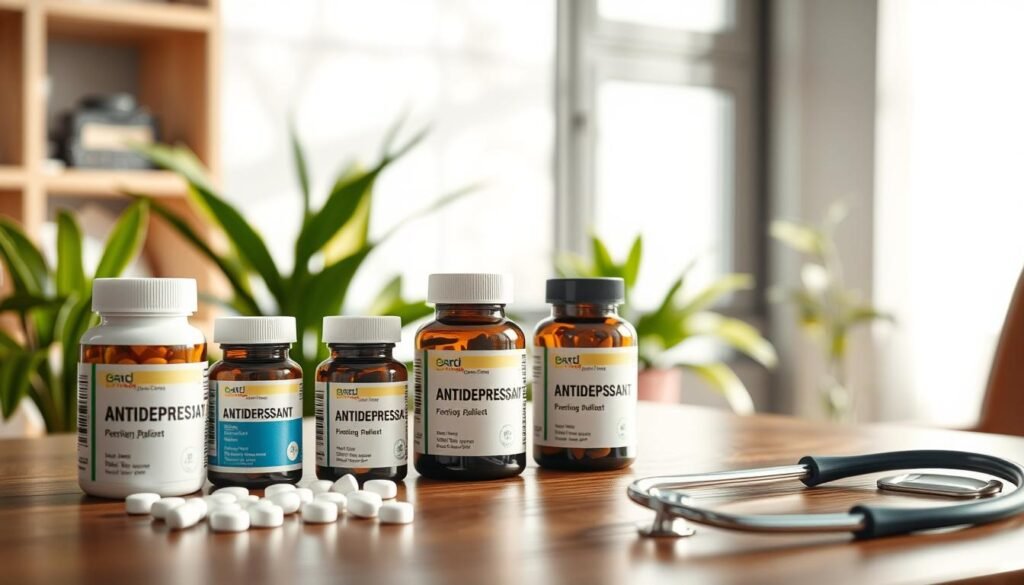Have you ever wondered why some people find relief from anxiety and depression with certain meds, while others don’t? Understanding mental health treatment is crucial. It’s because everyone reacts differently to antidepressants. This guide will explore the best options for treating anxiety and depression. It highlights the importance of custom treatment plans to improve life quality.
Key Takeaways
- Spectrum of antidepressant medications includes SSRIs, SNRIs, and more.
- Tailored treatment plans are essential for effective mental health treatment.
- Understanding the mechanism of action helps in choosing the right antidepressant.
- Collaborating with a healthcare provider ensures safe and effective use of antidepressants.
- Potential side effects vary widely among different antidepressant classes.
- Combining antidepressants with therapy may yield better outcomes.
Understanding Anxiety and Depression
Anxiety and depression deeply affect many in the U.S. About 20% face anxiety and another 10% deal with depression. These can occur alone or together, which makes treating them harder. Knowing their signs is key to grasp their effect on life.
Anxiety can cause a lot of worry, emotional upset, and even physical problems. It often includes racing thoughts and being overly alert. This can disrupt normal thinking. Depression, however, brings long periods of sadness, a drop in wanting to do things, and changes in sleep and eating. Tasks that are usually easy can feel impossible. This makes everyday life harder.
The interaction between depression and anxiety complicates diagnosis and care. It can create a cycle where each condition worsens the other. Getting help early from a professional is important for dealing with these issues effectively.
Knowing all about these conditions is crucial. Talking to doctors about what you’re feeling helps find the right treatment. With the right care, anxiety and depression can be managed. This opens the path to better living and stronger treatments for both conditions.
How Common are Anxiety and Depression?
Anxiety and depression are big health issues today. Mental health statistics show that about 20.6% of American adults face mental illness. Anxiety affects around 40 million adults every year in the U.S. About 7.2% of American adults have had a major depressive episode in the past year.
Studies link anxiety disorders closely with depression. Those with generalized anxiety disorder (GAD) often also have major depressive disorder (MDD). This mix makes treatment more complex. During the COVID-19 pandemic, depression rates tripled, showing the need for better treatments.
Around 44.8% of people with these conditions got help last year. It shows how vital it is to tackle these issues. The U.S. Preventative Services Task Force even suggests adult depression screenings in primary care settings. This can help people get the treatment they need sooner.
Treatment options like psychotherapy and medication have improved. Antidepressants help up to 70% of patients feel better. Knowing how widespread these disorders are is crucial for improving life quality through effective treatment.
| Condition | Prevalence in Adults (%) | Year |
|---|---|---|
| Anxiety Disorders | 40 million | Annually |
| Major Depressive Episode | 7.2 | 2018 |
| Any Mental Illness | 20.6 | Recent |
| Women with Mental Illness | 24.5 | Recent |
| Men with Mental Illness | 16.3 | Recent |
Symptoms of Anxiety Disorders
It’s key to know the signs of anxiety for good mental health care. People with anxiety disorders face both physical and emotional issues. They might have a fast heartbeat, sweat a lot, or feel their muscles tighten.
Emotionally, they may worry all the time, feel scared, or have sudden panic attacks. Restlessness, feeling very tired, easily upset, or having trouble sleeping can greatly affect daily life. For example, someone with social anxiety disorder might be very scared of being judged. This fear can stop them from joining in on work or school life. Understanding these signs is crucial for early help and the right treatment for anxiety.
Seeking help is vital for those dealing with mental health troubles. Treatments like cognitive behavioral therapy (CBT) can help manage anxiety disorders. Also, medicines, including Selective Serotonin Reuptake Inhibitors (SSRIs) and benzodiazepines, play a key role in treating these issues.
Finding out about anxiety symptoms may lead someone to look for help and ways to deal with it. Websites like WebMD and Immune Vitality have useful information. They help people understand and manage their anxiety better.
| Type of Disorder | Common Symptoms | Treatment Options |
|---|---|---|
| Generalized Anxiety Disorder (GAD) | Persistent worry, fatigue, irritability | SSRIs, CBT, self-care strategies |
| Panic Disorder | Frequent panic attacks, rapid heart rate | Benzodiazepines, exposure therapy |
| Social Anxiety Disorder | Fear of judgment, avoidance of social situations | SSRIs, psychotherapy |
| Specific Phobias | Intense fear of specific objects or situations | Exposure therapy, CBT |
| Separation Anxiety Disorder | Fear of being away from loved ones | Therapy, medication if needed |
Symptoms of Depression
It’s crucial to understand the various symptoms of depression. This knowledge can help spot it early for treatment. These symptoms include:
- Persistent sad mood
- Feelings of hopelessness
- Irritability and frustration
- Loss of interest or pleasure in activities
- Fatigue or decreased energy
- Difficulty concentrating or making decisions
- Changes in appetite, whether increased or decreased
- Physical aches or pain without a clear cause
- Thoughts of suicide or self-harm
Depression looks different in everyone, affected by age, gender, and social factors. Women often get diagnosed more than men. For men, symptoms like increased anger can go unnoticed. The LGBTQI+ community faces more depression due to societal challenges.

There are several forms of depression, each with unique signs and lengths. Major depression challenges daily life for at least two weeks. Persistent depressive disorder is milder but lasts two years or more. We also see seasonal affective disorder during dark winter months and depression linked to pregnancy.
Depression often comes with other mental or chronic illnesses. This complexity can change how it’s treated. Combining psychotherapy and medication can offer personalized relief. This aims at improving one’s overall life quality.
| Type of Depression | Duration | Symptoms |
|---|---|---|
| Major Depression | Minimum 2 weeks | Depressed mood, loss of interest, fatigue, difficulty concentrating |
| Persistent Depressive Disorder | At least 2 years | Less severe but chronic symptoms, affecting daily activities |
| Seasonal Affective Disorder | Varies, typically winter | Depressed mood, fatigue, low energy, changes in sleep patterns |
| Perinatal Depression | During pregnancy or within 1 year postpartum | Similar to major depression, may include anxiety related to parenting |
Spotting depression signs early helps people get the right support and treatment. This improves mental health for everyone involved.
Why Explore Antidepressants for Comorbidities?
Looking into antidepressants for people facing both anxiety and depression can better mental health. Many with generalized anxiety disorder (GAD) also face major depressive disorder (MDD). In fact, 62% of those with GAD have had MDD at some point. This overlap highlights the need for effective combined treatment options.
Drugs like selective serotonin reuptake inhibitors (SSRIs) and serotonin-norepinephrine reuptake inhibitors (SNRIs) are beneficial. They treat both conditions at once. This not only eases symptoms but also lowers the chance of worse outcomes. The link between GAD and MDD often leads to a worse outlook, underlining the importance of good management strategies.
People with both GAD and MDD usually feel more uncertain than those with just GAD. This added stress makes finding the right treatments crucial. These should include antidepressant medications, cognitive behavioral therapy (CBT), and more.
Using multiple treatments together can be more effective. One study showed that adding therapy to CBT greatly helped, more than using CBT alone. This supports why combining different treatments is a good approach.
| Condition | Lifetime Prevalence | Comorbidity with MDD |
|---|---|---|
| Generalized Anxiety Disorder (GAD) | 5.1% or possibly higher | 62% |
| Major Depressive Disorder (MDD) | 16.2% | 59% experienced MDD in the past year |
| Social Anxiety Disorder | 25.6% | N/A |
| Panic Disorder | 11.1% | N/A |
| Post-Traumatic Stress Disorder | 18.8% | N/A |
Best Antidepressant for Anxiety and Depression
Talking about the best antidepressant for anxiety and depression, we must look at the medication types. There are SSRIs (Selective Serotonin Reuptake Inhibitors) and SNRIs (Serotonin-Norepinephrine Reuptake Inhibitors). These are good options for people with anxiety and depression. Knowing the differences between these medications is key to choosing the right treatment.
Types of Antidepressants
- SSRIs: Often used for anxiety and depression, SSRIs include brands like Celexa, Lexapro, and Zoloft. They raise serotonin levels in the brain, which can improve mood and lower anxiety.
- SNRIs: This group has medications like Cymbalta and Effexor XR. SNRIs boost both serotonin and norepinephrine levels, offering a different way to help some patients.
- Atypical Antidepressants: This category contains Wellbutrin and Trintellix. They have unique ways of working and may be chosen if SSRIs or SNRIs don’t work.
- Tricyclic Antidepressants (TCAs): These may be used when other antidepressants aren’t effective. They’re not the first choice, though.
- Monoamine Oxidase Inhibitors (MAOIs): Usually considered if other treatments haven’t helped, showing they’re a backup option.
SSRIs vs. SNRIs: Which is Right for You?
SSRIs and SNRIs are both important for treating anxiety and depression. Choosing between them depends on personal needs and side effects. SSRIs are usually preferred because they work well and have fewer side effects.
SNRIs might be the choice for those not helped by SSRIs alone. Drugs like Zoloft and Lexapro focus on serotonin. Yet, something like Cymbalta, an SNRI, takes a broader approach. Working with a doctor helps pick the right antidepressant for each person’s unique situation.

Mechanisms of Action for Antidepressants
Antidepressants are crucial for treating anxiety and depression. They work mainly by affecting neurotransmitters. Learning about how these meds work helps us understand their role in improving mood and lowering anxiety.
There are two main types of antidepressants: SSRIs and SNRIs. SSRIs, such as Fluoxetine, increase serotonin at synapses by preventing its reuptake. This action is key to enhancing mood and handling anxiety. SNRIs, like Venlafaxine, not only raise serotonin but also increase norepinephrine. This double action helps ease symptoms effectively.
Many people are curious about how antidepressants work in their brains. They work by balancing neurotransmitters and making receptors more sensitive. For example, a malfunctioning HPA axis can raise CRH levels, causing more anxiety. Antidepressants help normalize these processes.
To show how different antidepressants work, see the table below:
| Antidepressant Class | Mechanism | Common Examples | Side Effects |
|---|---|---|---|
| SSRIs | Inhibit serotonin reuptake | Fluoxetine, Sertraline | Sexual dysfunction, sleep disturbances |
| SNRIs | Inhibit reuptake of serotonin and norepinephrine | Venlafaxine, Duloxetine | Nausea, dry mouth, dizziness |
| TCAs | Increase serotonin and norepinephrine | Amitriptyline, Nortriptyline | Constipation, dry mouth, rapid heartbeat |
| MAOIs | Inhibit monoamine oxidase enzyme | Phenelzine, Tranylcypromine | Drowsiness, insomnia, dietary restrictions |
Understanding the antidepressant mechanisms can help patients have realistic hopes for their treatment. Each drug works differently in the brain, changing neurotransmitter levels and mood.
Choosing the Right Antidepressant with Your Healthcare Provider
Finding the right antidepressant is key to managing mental health well. It’s important to work closely with a healthcare provider. They guide patients, ensuring treatments fit their unique health needs. Open talks and understanding between patient and provider are crucial.
Factors to Consider
Choosing antidepressants involves looking at personal health:
- Personal Health History: Past reactions to medicines, family health trends, and other conditions play a big role in the choice.
- Potential Side Effects: Antidepressants can have different side effects. Examples are SSRIs, SNRIs, and tricyclic antidepressants, affecting life quality.
- Medication Interactions: It’s important to know how antidepressants may mix with other drugs, especially when taking many medications.
- Symptom Profile: Certain symptoms decide the medication type. SSRIs are good for anxiety, while tricyclics help with sleep issues.
The journey to find the right antidepressant includes talks on how well they work, their safety, and side effects. Patients do better when they help decide their treatment. Keeping in touch with a healthcare provider helps tweak the treatment if needed.

Side Effects of Antidepressants
Antidepressants can be key in easing depression and anxiety. It’s crucial to know the side effects of antidepressants if you’re considering them. While they help, they also have risks. This means it’s very important to keep an eye on your medication during treatment.
Common Side Effects
There are some side effects that many people feel:
- Nausea
- Weight gain
- Dry mouth
- Fatigue and drowsiness
- Dizziness
- Insomnia
- Sexual dysfunction
These usually start early on but get better as your body gets used to the medicine. Talking openly with your doctor is important to balance the risks of antidepressant use with the good they do.
Severe Side Effects and Risks
Some severe side effects need quick action. They include:
- Suicidal thoughts or behavior, especially in those under 25
- Serotonin syndrome, a rare but serious reaction
- Overdose risks, mainly with certain types of antidepressants
- Increased risk of upper gastrointestinal bleeding
Watching your medication closely and being aware of side effects makes treatment safer. If bad symptoms happen, it’s very important to talk to a doctor. You can find more info on side effects here.
Alternative Treatments for Anxiety and Depression
There are many ways to help with anxiety and depression. Alongside common methods like medication, mental health alternatives target the root causes. Cognitive Behavioral Therapy (CBT) stands out, especially for those with more serious depression. Combining it with medication tends to give the best results for many people.
CBT works through a set plan, usually lasting 6 to 8 weeks. It can be in groups or one-on-one, offering a chance for personal growth or shared journeys. Online CBT is an option too, making it more accessible.
Interpersonal Therapy (IPT) also shows promise, focusing on personal relationships. It’s as effective as antidepressants and CBT in some cases. NHS counselling provides 6 to 12 sessions, aiming at specific challenges. Using techniques like these can be very healing.
Exercise is another powerful tool for mild depression. It boosts brain chemicals like serotonin and dopamine, lifting your mood and strength. For those not helped by standard treatments, Lithium or Electroconvulsive Therapy (ECT) could be alternatives.
St. John’s Wort works well for some types of depression. Ketamine offers quick help for tough cases. Yoga, music therapy, and guided imagery also offer benefits, supporting mental health in different ways.
While meds are important for anxiety and depression, trying various therapies can help too. Mixing several approaches may lead to better healing and strength.
Conclusion
Understanding the difference between anxiety and depression is key for effective treatment. This guide shows the importance of exploring treatment options, such as various antidepressants. The summary of findings shows how treatments differ in effectiveness and acceptance. This helps patients and healthcare providers make good choices.
It’s vital to work with doctors to find the best antidepressant. This ensures care is tailored to an individual’s unique needs. Continuous tracking and talking about treatment plans is crucial for the best results in tackling mental health issues.
The field of mental health treatment keeps changing. Staying up-to-date with the latest in antidepressant therapy is essential. Being active in discussion about treatment can greatly help one’s path to better mental health and happiness.